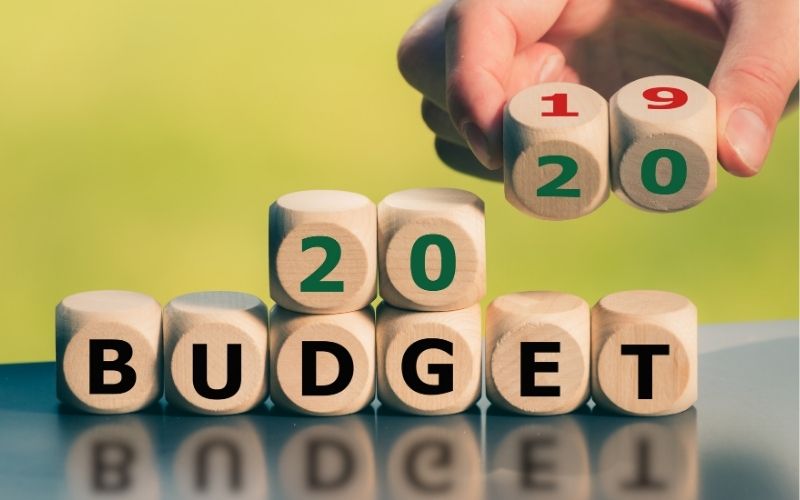What a week! The most important Federal Budget in a generation, the Reserve Bank board meeting and Donald Trump sending global markets into a spin over whether there is economic stimulus coming for the US or not… on top of some crazy comments about Coronavirus.
Let’s start with the Budget…a few quick comments before getting into some of the detail:
– The programs to put more money in the pockets of consumers and business is based on the premise we’ll spend it rather than save or pay down debt… that’s a big assumption.
– The tax savings won’t come immediately. It will be at least December before personal tax cuts will affect your monthly pay packet… and as the cuts are backdated to July the cuts for the first 5 months will be added to your tax refund next July/August.
Likewise the tax refund from business offsetting losses against past profits won’t hit the bank account for another 6-9 months.
– The big spending on infrastructure projects will take years to come through. There is a long time frame to get a new road or bridge up and going.
– So my worry is what is going to stimulate the economy in the short term when the full impact of tax cuts could be months away and infrastructure years away.
Another view of the Budget
I’m conscious that you shouldn’t just get my view on something as big as the Budget so I asked my colleague David Scutt at the Ausbiz business and markets streaming channel for his view;
The Federal Budget is unlikely to be enough to secure the longer-term economic security of Australia, a disappointing outcome given how generous the fiscal measures have been to date.
My chief concern is the outlook for private sector demand once temporary spending measures are wound back. Even before the coronavirus pandemic struck, it was already crook. Household consumption was soft, sitting at levels well below those seen in previous decades. Understandably, non-mining business investment was tepid, an understandable outcome given the weakness in consumer demand.
As anyone who has glanced at the budget already knows, these areas are being tasked with powering Australia’s economic recovery in the years ahead. The key question is whether the budget forecasts will be reflected in reality? Will the spending splurge at retailers be sustained and broaden with unemployment set to remain elevated for years?
Maybe, but income tax cuts will struggle to offset lost income from soft wage growth and reduced employment. In such an environment, will businesses be willing to invest? That’s anything but a given.
For me, even with everything that’s been rolled out, the government has missed an opportunity to cement Australia’s longer-term economic trajectory by unwinding support measures prematurely. Many have talked about building a bridge to carry us to the other side of the crisis. My concern is the bridge may end up like the one built at Tacoma Narrows.
This Budget was about you
This year’s Budget is designed to keep you and your boss happy and positive as we go through the deepest economic recession in living memory.
Yep, this is all about you and your job… because you are the economy. It’s that simple. Unemployment will peak at 8 per cent in December and take another 2 years to get back under 6 per cent.
That’s what is wreaking havoc with the economy. Jobs really are at the core of a healthy economy… and recovery from this recession.
If you’re in a job, you’re earning an income. Part of that income gets paid to the Government in tax and by spending what’s left over keeps businesses open so they can pay tax (from profits) to the Government and employ staff who, in turn, earn an income, pay their own tax and spend more.
What makes the economy go-round is pretty simple really. You earning an income from your job, spending it with a business so they can create jobs and everyone pays tax.
Yes the $213 billion Budget deficit and net Government debt of over $700 billion looks scary but, and I know this may sound weird, don’t worry about it.
While the figures look huge, our economy is also huge by comparison and our debt as a proportion of the economy is much lower than virtually every other advanced economy in the world. As a bonus, the Government is paying less that one per cent interest on that debt… so it’s cheap money.
So what’s in the Federal Budget to make you feel good and positive;
– The tax cuts due to start in July 2022 will be brought forward 2 years to start last July. Yes that means you’ve been paying too much tax for the first 4 months of this financial year but it also means you’ll get a bigger tax refund and there will be less tax taken out of your wage from now on.
For most working Australians that’s an extra $3000-$5000 (depending on your tax bracket) a year extra to go out and spend.
– Aged pensioners will receive a $500 bonus in two equal payments in December and March.
– There a raft of new job training programs, and billions being spent on infrastructure projects, all designed to create new job opportunities if you’re made redundant. Now for bosses. What’s in this Budget to keep them positive, keep people in a job and create more jobs;
– As we know already, the $101 billion JobKeeper program keeps going until the end of March even though the amount is reduced and eligibility rules have been tightened.
– For businesses not on JobKeeper they can receive a “hiring credit” of $200 a week if they add an eligible under 30 year old to their staff and $100 a week for a 30-35 year old new employee.
– If their business makes a loss this financial year they can offset that loss against profits they’ve made in the past 2 years (usually they can only offset losses against future profits). While they’ve already paid tax on those past profits, they’ll get a refund back once the losses are offset against them.
– Any investment in new assets for the business can be written off against their tax immediately instead of over a few years. Less tax means more money to spend or hire more staff.
The Australian economy was in pretty good shape going into this pandemic. It’s fair to say, if you had to be in any country in the world to get through this recession it would be Australia.
Which listed companies will benefit from the Budget
During the week I asked my guests on The Call (Ausbiz 12-1pm AEDT), Andrew Page from Strawman.com and Michael Wayne from Medallion Financial, about what they thought would be the impact of this Budget on stocks and where the opportunities lie.
Michael pointed out the announcement on increased infrastructure spending.
“I think the infrastructure spending was about $100 billion before the budget and it’s over $110 billion now. You’d expect the construction companies such as Adelaide Brighton (ABC), Boral (BLD) and Cimic (CIM) of this world should do quite well. Transurban (TCL) could also benefit.
“Broadly speaking, globally you’ll get a lot of infrastructure spending which should also benefit the building materials companies. I have never made an investment decision based purely on the Budget. Often a lot of this is anticipated and priced in already for the share prices. Budget is one factor among others in an overall decision. I think it can’t be the sole driver.”
Andrew agrees with Michael and says that he has never made an investment decision based on the Federal Budget.
“A Budget is not going to turn a crappy company into a good company or vice versa. It’s a tool just to incentivise businesses so it does provide headwinds and tailwinds to certain sectors.
“Markets are always forward-looking and this gets priced in ahead of the budget release. When you look at the previous budgets, I am yet to see any sustained impact over the long term. The retailers could get a bit of kick out of the tax cuts, etc.”
SUPERANNUATION
As many of you know I get pretty vocal about how easy superannuation funds have it compared with most other sectors. A legislated river of financial gold pours in every month via compulsory contributions and regulation makes it hard to switch funds or get that money out until retirement.
As a result there are a number of lazy, poor performing funds sitting on billions of dollars of investor retirement savings.
So I loved the changes to super in the Budget which are making funds more accountable for their performance… and you will own your account rather than the fund.
The Government’s reform agenda and will see Australians save $17.9 billion over the next decade. Unintended superannuation accounts erode members’ balances through unnecessary fees and insurance premiums.
For the first time, Australians will automatically keep their superannuation fund when they change employers. ‘Stapling’ the super fund to the employee will ensure that their super follows them when they change jobs, stopping the creation of unintended multiple accounts.
The Government is also making it simple for Australians to choose a better super fund. This will result in more competition, which will drive down fees and increase retirement savings.
The new online YourSuper comparison tool will help people compare the performance of MySuper products and make it easy to choose a fund.
The Government is also requiring funds to meet an annual performance test. If funds fail the test they will be required to write to inform members and give them the option to move their money to a better performing fund.
Funds that continue to underperform will no longer be allowed to receive new members until their performance improves.





























Trending